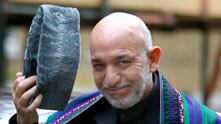
When Hamid Karzai is re-inaugurated as president today after one of the world’s dodgiest elections, everyone from Washington to Whitehall will be watching for some sign that he will clean up his act. If he doesn’t, many—including U.S. Ambassador Karl Eikenberry—believe it will be well nigh impossible to defeat the Taliban, however many troops President Obama might ultimately decide to send.
Britain’s Prime Minister Gordon Brown has described the Karzai government as a “byword for corruption” and warned he will “forfeit” international support if he doesn’t improve. The Obama administration has given the same message and suggested a list of clean names they would like to see in the cabinet.
But while the international community increasingly sees Karzai as the problem, the Afghan president says he believes he is doing nothing different than he has since they put him there in December 2001 and it is they who are trying to undermine him.
“The application of standards here by the international community has been hypocritical,” he complained to me when I asked about this. “That’s the problem with the international community. They want us to behave like robots. Well, we’re not like that.”
If Hamid Karzai is divorced from reality, it’s hardly surprising. The last time I went to see him in the presidential palace in August, I had to pass through seven layers of security. By the end, I had been stripped of all belongings including a pen, the chocolates I had brought as a present and even my lipstick, all of which could apparently have been used as deadly weapons.
Perhaps such precautions are necessary; Afghanistan’s president has survived three assassination attempts and one of his aides once took me on a grisly tour of the Arg, as the sprawling palace complex is known, to show the spots where most of Karzai’s predecessors met horrible ends. The last, Dr. Najibullah, was castrated in his bedroom by Taliban, tied to a Taliban Toyota Land Cruiser and dragged round and round the grounds then hung from a traffic post outside for all to see.
But even inside these seven rings of security, Karzai is flanked by 10 gunmen and monitored by snipers just to walk the 100 yards between his office and home. A keen walker, his exercise is now confined to pacing around his small walled garden with its two baby deer. All his food first goes through a team of personal tasters. In other words, this is a man who is totally cut off and increasingly paranoid.
I’ve known Karzai since 1987, when for two years I lived a few blocks away from him in Peshawar. In those days, he was unknown, the spokesman for the Afghan National Liberation Front, which was the smallest of the seven resistance groups fighting the Russians.
Hardly any journalists went to visit him back then, so he was delighted to talk, particularly as he had gone to school in the old Indian hill-station of Simla and was a real Anglophile. He loved Cadburys chocolate, Somerset Maugham stories, and English movies. He dressed in a battered leather jacket and jeans and had a big belly laugh.
• Gerald Posner: Karzai’s Brothers Fight BackHe was also an extremely proud member of the Popalzai tribe, one of the Durrani tribes of Kandahar descended from Afghanistan’s first king. His house was always crowded with tribal elders for whom he was expected to provide vast cauldrons of rice and mutton, as well as lodging and money to get them home again. I was fascinated by their stories, most of which involved feuds and revenge and an honor code that meant protecting guests even if they had committed a crime.
Karzai’s dream was to be a diplomat or maybe foreign minister. He lived in awe of his father, chief of the Popalzai tribe, and it was because of him the tribesmen came to visit.
The only time Karzai went inside Afghanistan during the Soviet occupation, I accompanied him. We traveled around Kandahar on motorbikes with a group called the Mullahs Front (who went on to be the Taliban), lived on dry bread and okra, taking part in an ill-advised attack on Kandahar Airport.
I had never met anyone with such a passion for their country. For me, England was just somewhere I had happened to be born, and I could imagine being just as happy in many other places. But to Karzai, his homeland meant everything.
Shortly after that, the Russians withdrew; the Afghans were abandoned by the U.S. and other countries. Karzai had always spent freely the money provided by the CIA and other agencies; when it dried up, he quickly ran out. After a brief stint as deputy foreign minister in the mujahideen government, he moved to Quetta, where he was supported by his half-brother Ahmed Wali. In the early days of the Taliban, he worked as their chief fundraiser before turning against them.
It was in Quetta one day in 1999 when his father was assassinated on the way back from the mosque. Although Karzai was one of the youngest of the seven brothers, he was named head of the tribe as the others had gone to America, where they were doing things like running restaurants. Heading the tribe meant finding a wife, so he married a cousin Zeenat, an obstetrician at Quetta hospital.
I was in Herat when he was named interim president after the fall of the Taliban, and most Afghans I met had never heard of him.
In fact, the hastily convened Bonn conference of Afghan representatives to choose an interim leader did not vote for him; their choice was Abdul Sattar Seerat, a former justice minister close to the ex-king. But the international community feared he would not be acceptable as he did not come from the majority Pashtun tribe. Karzai had won just three votes.
It was very odd to go to Kabul in early December 2001 and see him sitting in the palace, shivering by the single bar electric fire that was the only heat.
I laughed to see him in traditional dress. He explained that his long striped silk coat, or chapan, and astrakhan hat had been given to him to keep warm as he’d been flown in there from the south with no clothes. Later, when Tom Ford described him as the “chicest man on the planet”, he had little choice but to adopt that as his look.
Soon, the Karzai brothers drifted back from overseas. The eldest Qayyum became a key adviser now very involved with attempts to talk to the Taliban. Others sensed business opportunities. Mahmood got involved in Toyota dealerships and cement plants, becoming vice chairman of the Chamber of Commerce—and went on to run Karzai’s election campaign. Ahmed Wali looked after the family interests in Kandahar, becoming the most powerful man in the south and allegedly the biggest drug lord.
Many Afghans blame the warlords above all for the destruction of their country. At the beginning, Karzai was eager to get rid of them, telling me he would like to “chop off all their heads.” I was there when he and Qayyum came up with a plan to make them tour guides, with each showing which part of Kabul they were responsible for destroying.
But with no forces of his own, he needed Western backing to take them on. Instead the U.S. forces hunting for Osama bin Laden started working with the warlords, seeing them as the best way to get local information and paying them handsomely.
As the initial love affair wore off and Western ambassadors complained to him about corruption or incompetence such as the fact it averaged 51 bribes to get a car registered, he would always reply, “you don’t understand the political realities of Afghanistan.”
The West might have been paying for everything and providing the security. But there was a pretense of sovereignty, which made them reluctant to exert pressure. President George W. Bush in particular refused to hear anything bad about his friend.
And so for far too long, a collective blind eye was turned. Nobody mentioned the fact that one of the reasons given for ousting the Taliban was their repression of women. Yet Karzai never let his own wife be seen in public, despite the fact she had been a doctor before they married. He appointed only one female minister and when a brave young girl managed to get a court to convict a man for her horrific gang rape, Karzai gave him a presidential pardon.
So will he change? The signs are not good. He cannot understand how the West can criticize him for making deals with warlords to get reelected when they worked with them for so long.
“The application of standards here by the international community has been hypocritical,” he complained to me when I asked about this. “That’s the problem with the international community. They want us to behave like robots. Well, we’re not like that.”
One thing the West does not understand is that loyalty which I heard all about in his house in Peshawar all those years ago. This is why he has not followed advice to send away his brother Ahmed Wali; he owes him. It’s also why he brought into his key posts—such as his chief of staff—former top aides of warlord Gulbuddin Hekmatyar; back in 1996, they helped Karzai escape Kabul.
In September 2006, I was in his office when he met with General Eikenberry, then commander of the NATO troops. U.S. forces had arrested a man in Uruzgan with a block of opium and suspected links to Taliban. Karzai was furious. “I don’t care what he’s done,” he told the general. “He’s helped me in the past and you must release him.”
Earlier this year, he pardoned five convicted heroin traffickers, apparently to win the support of an important political family in Jalalabad. “It’s not pardoning criminals, it’s giving a new opportunity to an 18 year old whose family paid tremendous sacrifice for this land,” he told me.
Yet by contrast for a year he refused endless pleas from diplomats to pardon Pervez Kambaksh, a 23-year-old journalist sentenced to death for downloading material on women’s rights from the Internet. Only when under fire for the election debacle did he finally agree in September.
“We’re a state and just as in any country the president has the right of forgiving and pardoning”, he insisted when I asked him about this. “I have my environment here under which we function and when things need to be done for a purpose I will do it.”
If nothing else he has kept his country together. And he might well ask: If he doesn’t change, what will Obama and company do?
Christina Lamb is Washington bureau chief of the London Sunday Times and has been covering Afghanistan and Pakistan for 22 years. She has been named Britain's foreign correspondent of the year five times. Her books include Sewing Circles of Herat: A Personal Voyage Through Afghanistan (Harper Collins).






